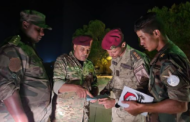May 3, as top-level Turkish delegation visits Tripoli, GNU FM Al-Mangoush calls for foreign fighters withdrawal, including Turkish military, sparking vast controversy.
May 6, GNU appoints Maj. Gen. Hussein Mohammed Al-A’eb as intelligence chief, replacing Trabelsi;
May 7, state-recognized militiamen storm PC temporary premises in Tobruk Corinthia Hotel, demanding Al-Mangoush, other cabinet members to be fired, Trabelsi to stay as intelligence chief.
AL-KUFRA
- May 6, the Sobol Al-Salam Brigade affiliated with the Libyan National Army (LNA) seized six trucks that were smuggling large quantities of tobacco into Egypt. In a statement, the Brigade Command said that one of its patrols in Al-Kufra managed to seize the trucks loaded with tobacco, 170 kilometers south of the city, near the border with Egypt. It explained that “the vehicles were confiscated, and the drivers were arrested and are being investigated within the next few days”;
SIRTE
- May 9, the Libyan Government of National Unity (GNU) announced the establishment of a sovereign fund for the reconstruction of the city of Sirte, which will be financed with one billion Libyan dinars. According to the GNU’s decision, the fund has a legal personality, and an independent financial liability, and is based in the city of Sirte. The fund aims to reconstruct and rehabilitate areas devastated by the war in Sirte, in order to achieve development goals and address damage to buildings and infrastructure there;
- The residents of Sirte called on Prime Minister of the GNU, Abdel-Hamid Al-Dabaiba to immediately intervene to open the coastal road, describing it as the “lifeline”, between Sirte and Misrata. In a statement May 4, the residents said that they were suffering “severe damage” as a result of the continued closure of the road. They explained that its closure negatively affected the lives of citizens, and caused a “severe shortage” of fuel and medical supplies, and an increase in the prices of commodities and foodstuffs.
TOBRUK
- May 9, dozens of Tobruk residents belonging to all tribal groups deplored the attack that took place May 7 against the headquarters of the PC in Tripoli, when state-recognized militiamen reportedly stormed the Corinthia Hotel where PC meetings were being held, demanding Al-Mangoush and other cabinet members to be dismissed, and Trabelsi maintained as chief of the intelligence service, instead of the newly appointed Al-A’eb.

NATIONAL POLITICS AND SECURITY
- May 9, the ‘Moderate Parliamentary Bloc’ expressed its concern about the slow pace taken by Libya’s new PC and its “confusing decisions” including the “establishment of reconstruction funds without outlining a comprehensive and well-prepared vision that prevents corruption and includes all affected cities.”;
- May 9, the Deputy Head of Libya’s Presidential Council (PC), Musa Al-Koni, and the Minister of Foreign Affairs and International Cooperation, Najla Al-Mangoush, held talks with a number of military and security leaders and local officials in Ghat city to discuss unifying the army and securing the southern borders;
- On Friday, Al-Koni also met with mayors of the municipalities of the southern region, and discussed the security situation. The meeting was held at the headquarters of Ubari municipality. The meeting dealt with reviewing the needs of the citizens, and the living and service conditions in South of Libya;
- May 9, the Social Councils Committee of the Tribes of Warfalla, Qadhadfa, Al-Maqaraha and Suleiman Sons, in charge of following up on the dossier of prisoners in Libya, called on the GNU to release the politicians who were issued for release by the national judiciary rulings.
- May 6, the Libyan PC appointed Major General Hussein Mohammed Al-A’eb to serve as the Head of the country’s intelligence service. According to the PC’s decision No. 17 of 2021, the appointment of Al-A’eb replaces Mustafa Al-Muqrin, who was appointed by the Libyan Parliament, and Emad Trabelsi who was appointed by the previous Prime Minister of the Government of National Accord (GNA), Fayez Al-Sarraj;

- The Libyan Prime Minister, Abdul-Hamid Al-Dabaiba, told Al Jazeera TV in an interview May 4 that the Government of National Unity “is not coordinating with Khalifa Haftar in Benghazi, rather it’s doing so with police apparatuses and the mayor of Benghazi.
INTERNATIONAL RELATIONS
- May 9, the Libyan Foreign Minister, Najla Al-Mangoush, called on neighbouring countries to urgently form regional mechanisms to combat smuggling, illegal migration, and human trafficking. Al-Mangoush will visit countries of origin for immigration to coordinate returning their citizens. She explained that she would submit a bill to the Libyan House of Representatives (HoR) to tighten penalties for smugglers and human traffickers;
- May 9, The Libyan Ministry of Foreign Affairs condemned the storming of the courtyards of Al-Aqsa Mosque by Israeli police forces and the attack on the safe, unarmed worshipers of the Palestinian people while performing their religious rites during the holy month of Ramadan;
- On Friday, Italian Defence Minister, Lorenzo Guerini, condemned the Libyan Coastguard for firing shots at Italian fishermen after one was injured, saying it was “a dangerous matter.” The incident took place May 6 off the coasts of Libya;
- May 6, the Libyan House of Representatives (HoR) announced its categorical rejection of the joint statement issued by the embassies of Germany, Italy, the United Kingdom, France, and the United States in Libya. The HoR said it is an example of unacceptable interference in the internal affairs of Libya and does not serve the national consensus that has been finally achieved after great efforts over the last months;
- May 7, six Libyan political blocs (Civil Democratic Caucus, Libya Revival Bloc, Al-Wasat Youth Movement, Libyan National Movement, National Center Party; Libyan Youth Movement) expressed their gratitude for the statement issued by the Group of Seven industrialized countries (G7) regarding support for the December elections, and the withdrawal of all foreign and mercenary forces from Libya.;
- May 7, the Kingdom of Saudi Arabia reaffirmed its support for a political solution in Libya, the Saudi Ambassador to Tunisia said during a meeting with Deputy Head of the Libyan PC, Abdullah Al-Lafi. During the meeting, the two discussed the latest developments in Libya. In a tweet, Al-Lafi said that he had a fruitful meeting May 6 in the Tunisian capital, with the Ambassador, Abdul-Aziz bin Ali Al-Saqr;
- May 6, Libya’s Prime Minister, Abdel-Hamid Al-Dabaiba reiterated his commitment to the maritime border demarcation agreement concluded in November 2019, between the previous Libyan Government of National Accord (GNA), and Turkey. Al-Dabaiba said in a televised statement that his GNU differs from Greece in evaluating the memorandum of understanding signed with Turkey. He claimed that this agreement granted Libya wide economic areas in the Mediterranean, that could be invested heavily. “The agreement serves the Libyan people and benefits them. Their government will not neglect it”;
- May 6, it was reported that Vice-Admiral Fabio Agostini, the Commander of Operation IRINI which monitors the UN arms embargo on Libya, will soon head for Tripoli to discuss the possibility of resuming the training program of the Libyan Coast Guard;
- May 5, German Chancellor Angela Merkel told Turkish President, Recep Tayyip Erdogan that the withdrawal of foreign troops from Libya would be an “important signal” as both leaders vowed to support the new interim GNU, a German government spokesman said. Merkel and Erdogan agreed in a video conference to support the GNU in its efforts to improve the fragile situation in the war-torn country, and prepare for the December elections;
- May 4, Prime Minister of Libya’s GNU, Abdel-Hamid Al-Dabaiba, received the Kuwaiti Minister of Foreign Affairs, Ahmad Nasser Al-Mohammed Al-Sabah to discuss the latest political developments in Libya, and ways of enhancing bilateral relations. Libya’s Minister of Foreign Affairs, Najla Al-Mangoush also attended the meeting;
- May 4, the Syrian Observatory for Human Rights (SOHR) reported that the repatriation of Syrian fighters from Libya had been completely suspended by Turkey;
- May 3, Libya’s GNU called on Turkey to cooperate in ending the presence of foreign forces and mercenaries on its territory, and demanded that it contribute to preserving the ceasefire agreement. Turkish Foreign and Defense Ministers, Mevlüt Çavuşoğlu and Hulusi Akar visited Tripoli May 3 to hold talks with Libyan officials, including GNU Prime Minister, Abdel-Hamid Al-Dabaiba. During a press conference with her Turkish counterpart, Libyan Foreign Minister Najla Al-Mangoush said: “We call on Turkey to take steps to fully implement the provisions of the Berlin Conference outcomes, and the Security Council resolutions and to cooperate to end the presence of all foreign forces and mercenaries deployed on Libyan soil, in order to preserve the sovereignty of the Libyan people.” Al-Mangoush’s statements irritated Turkey and sparked a lot of criticism as well as fierce support inside Libya, where the Turkish military involvement in the country remains a divisive topic. The US Ambassador to Libya, Richard Norland, and US Secretary of State, Antony Blinken announced their full support for Al-Mangoush.




























